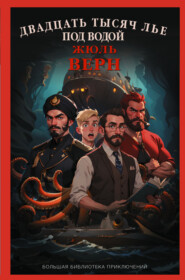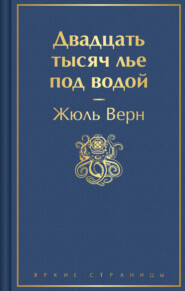По всем вопросам обращайтесь на: info@litportal.ru
(©) 2003-2024.
✖
Round the World in Eighty Days
Настройки чтения
Размер шрифта
Высота строк
Поля
"So, Mr. Fogg," she replied, "not satisfied with having saved me from death, you wished to insure my comfort in a foreign country."
"I did," replied Fogg; "but fate was unpropitious. However, I wish to place at your disposal the little I have left."
"But," she exclaimed, "what will become of you, Mr. Fogg?"
"Of me, madam? I am in want of nothing."
"But," she continued, "how can you bear to look upon the fate in store for you?"
"As I always look at everything," replied Mr. Fogg; "in the best way I can."
"At any rate," said Aouda, "your friends will not permit you to want anything."
"I have no friends, madam."
"Your relations, then."
"I have no relations now."
"Oh then indeed I pity you, Mr. Fogg. Solitude is a terrible thing. Not a single person to whom you can confide your sorrow? Though they say that even grief, shared with another, is more easily supported."
"So they say, madam."
"Mr. Fogg," said Aouda, rising and extending her hand to him, "do you care to possess at the same time a relative and a friend? Will you take me for your wife?"
Mr. Fogg had risen also. There was an unusual gleam in his eyes, and his lips trembled. Aouda looked at him. In this regard of a noble woman, who had dared everything to save the man to whom she owed her life, her sincerity, firmness, and sweetness were all apparent. He was at first astonished, and then completely overcome. For a moment his eyes closed, as if to avoid her glance, and when he opened them again he said simply:
"I love you. By all I hold sacred, I love you dearly; and I am yours for ever."
"Ah!" exclaimed Mrs. Aouda, as she pressed her hand upon her bosom.
Passe-partout was immediately summoned. Mr. Fogg was still holding the lady's hand. Passe-partout understood it all, and his face became radiant.
Mr. Fogg asked him if it were too late to notify the Rev. Samuel Wilson, of Marylebone Church, about the wedding.
Passe-partout smiled, as he replied, "It is never too late." It was then five minutes past eight.
"Will the wedding take place to-morrow, Monday?" he said "Shall we say to-morrow?" asked Mr. Fogg, turning to Aouda.
"If you please," she replied, blushing.
Passe-partout hurried away as fast as he could go.
CHAPTER XXXVI
In which Phileas Fogg's Name is once again at a Premium on the Exchange.
It is now time to say something of the change which English opinion underwent when the true bank robber, one James Strand, was arrested in Edinburgh on the 17th of December.
Three days before Fogg was a criminal, followed by the police; now he was a gentleman, who had only been taking an eccentric journey round the world. There was great discussion in the papers, and those who had laid wagers for or against Mr. Fogg rose once more as if by magic. The "Fogg Bonds" were once more negotiated, and Phileas Fogg's name was at a premium.
The members of the Reform Club passed those three days in great discomfort. Would Phileas Fogg, whom they had forgotten, return? Where was he on that 17th of December, which was the seventy-sixth day after his departure, and they had had no news of him? Had he given in, and renounced the struggle, or was he continuing the journey at a more reasonable rate, and would he appear on Saturday, the 21st of December, at a quarter to nine in the evening, as agreed upon?
We cannot depict the intense agitation which moved all classes of society during those three days. Telegrams were sent to America and Asia for news of Mr. Fogg, and people were sent, morning and night, to Saville Row; but there was no news. Even the police did not know what had become of Fix. But all these things did not prevent bets being made, even to a greater amount than formerly. Bonds were quoted no longer at a hundred per cent. discount, but went up to ten and five; and even old Lord Albemarle was betting at evens.
So that Saturday night a great crowd was assembled in Pall Mall and the Reform Club. Traffic was impeded; disputes, arguments, and bets were raging in every direction. The police had the greatest difficulty to keep back the crowd, and as the hour when Mr. Fogg was due approached, the excitement rose to fever-heat.
That evening that gentleman's five friends had assembled in the drawing-room of the club. There were the two bankers, John Sullivan and Samuel Fallentin; Andrew Stuart, the engineer; Gauthier Ralph, the director of the Bank of England; and Thomas Flanagan, the brewer; all awaiting Mr. Fogg's return with the greatest anxiety.
At twenty minutes past eight Stuart rose and said: "Gentlemen, in twenty-five minutes the time agreed upon will have expired."
"At what time was the last train due from Liverpool?" asked Flanagan.
"At 7.23," replied Ralph; "and the next does not arrive till past midnight."
"Well, then, gentlemen," replied Stuart, "if Mr. Fogg had arrived by the 7.23, he would have been here before now, so we may look upon the bet as won."
"Do not be in too great a hurry," replied Fallentin. "You know that our friend is very eccentric, and his punctuality is proverbial. I, for one, shall be astonished if he does not turn up at the last minute."
"For my part," said Stuart, who was very nervous, "if I should see him I could not believe it was he."
"In fact," replied Flanagan, "Mr. Fogg's project was insane. No matter how punctual he may be, he cannot prevent some delay; and a day or two would throw all his arrangements out of gear."
"And you will remark besides," said Sullivan, "that we have not received any news from him all the time he has been away, although there are telegraphs all along his route."
"He has lost, gentlemen," said Stuart, "a hundred times over. The only ship he could have come by and been in time was the China, and she arrived yesterday. Here is a list of the passengers, and Phileas Fogg's name is not included. On the most favourable computation our friend can scarcely have reached America. I do not expect him for the next twenty days, and my Lord Albemarle will lose his five thousand pounds."
"Then we have nothing to do," replied Ralph, "but to present his cheque at Baring's to-morrow."
The hands of the clock were then pointing to twenty minutes to nine.
"Five minutes more," said Stuart.
The five friends looked at each other. One could almost hear their hearts beating, for it must be confessed that even for such seasoned players the stakes were pretty high, but they did not wish their anxiety to be remarked, and on Fallentin's suggestion they sat down to whist.
"I would not give up my four thousand pounds," said Stuart as he sat down, "if anyone were to offer me three thousand nine hundred and ninety-nine."
The clock pointed to eighteen minutes to nine.
The players took up their cards, but kept looking at the clock. No matter how safe they felt, the minutes had never appeared so long.
"8.43," said Flanagan, as he cut the pack Ralph passed to him.
At that moment the silence was profound, but the cries of the crowd outside soon rose again. The clock beat out the seconds with mathematical regularity, and each of the players checked every tick of the pendulum.
"8.44," said Sullivan, in a voice which betrayed his nervousness.
One minute more and they would have won their bet. They laid down their cards and counted the seconds.

















